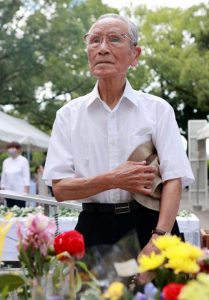Summer following conclusion of Hiroshima Summit—Yoshio Harada, who experienced A-bombing in main G7 venue of Motoujina, calls for Hiroshima’s message to be communicated
Aug. 7, 2023
Cannot forget faces of his classmates
‘Nuclear weapons can destroy world; would be better off without them’
by Kana Kobayashi, Staff Writer
Yoshio Harada, 93, experienced the atomic bombing in the area of Motoujina-machi (on Ujina Island), located in Hiroshima’s Minami Ward. His classmates were killed in the bombing, and the images etched in his mind are of them as they were in their mid-teens. When Hiroshima hosted the summit meeting of the G7 (Group of Seven industrialized nations) in May, Motoujina-machi served as the gathering’s main venue. At that time, the leaders attending the summit visited Peace Memorial Park’s Cenotaph for the A-bomb Victims, in the city’s Naka Ward. On August 6, Mr. Harada visited that same memorial cenotaph and offered his hopes for a nuclear-free world.
“When I come here, I remember the faces of my friends,” said Mr. Harada. He visited the cenotaph, offered white chrysanthemums, and placed his hands together in prayer. He spoke the names of his friends one by one as he recalled those days 78 years ago.
Mr. Harada was a fourth-year student at Hiroshima Municipal First Technical School (present-day Hiroshima Prefectural Technical High School). On the morning of August 6, he was scheduled to go to the city center to help tear down buildings in work to create fire lanes, but his upset stomach meant he was late leaving the house. As he sensed an intense light and felt the ground shudder at the entrance to his home, the A-bomb’s blast lifted the ceiling and shattered the glass on the west side of the second floor.
According to such sources as the Record of the Hiroshima A-bomb War Disaster, 50 of the school’s students, including Mr. Harada’s classmates, and three teachers were killed in the bombing. They had been mobilized to tear down buildings in the area of Kako-machi and around Tsurumi Bridge, in Hiroshima’s present-day Naka Ward. The day before, August 5, Mr. Harada had played in the Motoyasu River with his classmates after finishing their work.
“It was very hard. They didn’t want to die,” he said. The untimely deaths of his friends broke his heart. Filled with remorse, he always offers a prayer on the anniversary of the atomic bombing. “I’m so sorry you died while working for all of us.”
“Nuclear weapons can destroy the world, and we would be better off without them,” said Mr. Harada. Soft-spoken Mr. Harada resolutely expressed his desire for the world leaders who had gathered in Hiroshima for the G7 summit in May to act. “However hard we try, there is a limit to what we can do to send out our message. I want the heads of nations to speak with each other and lead the world.”
(Originally published on August 7, 2023)







